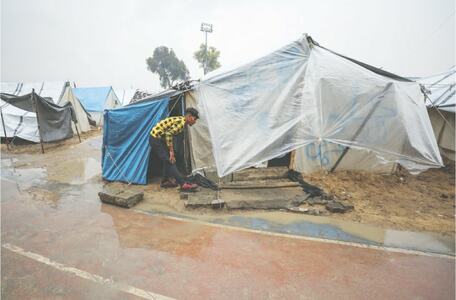ABU DHABI: The United Arab Emirates (UAE), a business hub long dependent on guest workers from Asia, announced labour reforms on Tuesday to protect foreign workers, who rights groups say are often abused by employers and prevented from changing jobs.
The trade, energy and investment powerhouse is one of several Gulf Arab states whose treatment of foreign workers has been criticised repeatedly by campaign groups demanding the repeal of what they consider oppressive labour laws.
Much of this concern is focused on a sponsorship system known as “kafala” that most Gulf states enforce on foreign workers. It not only regulates entry and residence, but also requires they seek permission from employers to change jobs.
Labour Minister Saqr Ghobash said that from January 2016 the UAE would take steps which, when completed, would get rid of “all the practices that were associated with kafala”.
He outlined steps strengthening the right to change employer and preventing “involuntary labour” by lodging the workers' contracts with the labour ministry rather than with the employers, who currently hold the documents.
“The worker cannot, under any circumstances, be made to, or otherwise be compelled, to remain in an employment relation,” a ministry statement said.
Lower Wages
A reorganisation of labour contracts would also stop so-called “substitution”, where foreign workers sign one contract before they leave their home country and are compelled to renegotiate lower wages when they arrive in the Gulf.
Guest workers do many of the dirty and dangerous jobs in the region, from construction to the oil industry, transport and services. They account for nearly half of the roughly 50 million population of the six-nation Gulf Cooperation Council and about 4.5 million of the nine million UAE population.
Most blue-collar workers in Gulf Arab states are hired on contract from countries like Pakistan, India, Bangladesh and the Philippines, many of whom have come to the Middle East to escape poverty in their home country.
Typically employed on low wages, workers are usually housed in camps with basic facilities on the outskirts of cities.
In many Gulf Arab states, passports of guest workers are held by the sponsor for the duration of their contracts. Although this is banned in the UAE, the practice survives.
Nicholas McGeehan, UAE researcher at Human Rights Watch, said the move against contract substitution “is a huge improvement and something we would fully support and applaud” and it was “good to see” the UAE feeling the need to reform.
But he said many steps did not appear particularly new or ground-breaking, and rights groups wanted evidence of change.















































